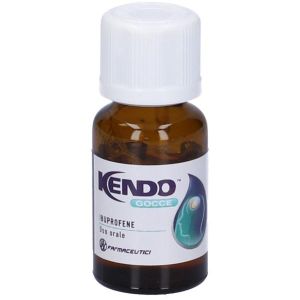Ship in Europe, Find out rates!
Language
Kendo Oral Drops 200mg/ml Ibuprofen 12.5ml

Regular Price
€5.50
Special Price
€3.37
-39%
Save: €2.13
In stock
Recent lowest price:
€3.36
- box Delivery in Italy in 24/48 and free returns
- star3.000+ positive reviews
- dropboxOver 60,000 products in the catalog
Manufacturer
ABC FARMACEUTICI
SKU
038061014
Active principle
IBUPROFENE
NAME
KENDO 200 MG / ML ORAL DROPS, SOLUTION
PHARMACOTHERAPEUTIC CATEGORY
Non-steroidal anti-inflammatory / antirheumatic drugs.
ACTIVE PRINCIPLES
1 ml of solution contains: ibuprofen 200 mg.
EXCIPIENTS
Sucrose, glycerol, potassium hydroxide, anhydrous sodium sulphite, polysorbate 20, methyl para-hydroxybenzoate, sodium citrate dihydrate, sodium saccharin, sodium edetate, orange / lemon / caramel flavor, erythrosine (E127), purified water.
INDICATIONS
Pain of various origins and nature (headache, toothache, neuralgia, osteo-joint and muscle pain, menstrual pain). Adjuvant in the symptomatic treatment of fever and flu.
CONTRAINDICATIONS / SECONDARY EFFECT
Hypersensitivity to the active ingredient, to any of the excipients or to other antirheumatics (acetylsalicylic acid, etc.). Do not administer under the age of 12. Pregnancy and breastfeeding. Active or severe gastroduodenal ulcer or other gastropathies. History of gastrointestinal haemorrhage or perforation related to previous active treatments or history of recurrent peptic ulcer / haemorrhage (two or more distinct episodes of proven ulceration or bleeding). Severe hepatic or renal insufficiency. Severe heart failure (NYHA class IV).
DOSAGE
Adults and children over 12 years: 25-50 drops, two to three times a day (25 drops = ibuprofen 200 mg). Do not exceed doses of 50 drops three times a day. Do not exceed the recommended dose; in particular elderly patients should follow the minimum dosages indicated above. In adolescents (aged> = 12 years to <18 years): if the use of the drug is necessary for more than 3 days in adolescents, or in the case of worsening of symptoms, a doctor should be consulted. Take the drug on a full stomach (preferably after breakfast, lunch or dinner). Undesirable effects can be minimized by using the lowest effective dose for the shortest possible duration of treatment needed to control symptoms.
STORAGE
This medicine does not require any special storage conditions.
WARNINGS
In asthmatic patients the product should be used with caution consulting your doctor before taking it. The use is not recommended in women who intend to become pregnant. Administration should be discontinued in women who have fertility problems 'or who are undergoing investigation of fertility'. Concomitant use should be avoided with NSAIDs, including selective COX-2 inhibitors. Undesirable effects can be minimized by using the lowest effective dose for the shortest possible duration of treatment needed to control symptoms. Clinical studies suggest that the use of ibuprofen, especially at high doses (2400 mg / day), may be associated with a modest increased risk of thrombotic arterial events (e.g. myocardial infarction or stroke). In general, epidemiological studies do not suggest that low doses of ibuprofen (e.g. <= 1200 mg / day) are associated with an increased risk of arterial thrombotic events. Patients with uncontrolled hypertension, congestive heart failure (NYHA class II-III), established ischemic heart disease, peripheral arterial disease and / or cerebrovascular disease should only be treated with ibuprofen after careful consideration and high doses (2400 mg / day) should be avoided. . Careful consideration should also be exercised before initiating long-term treatment in patients with risk factors for cardiovascular events especially if high doses (2400 mg / day) of ibuprofen are required. Elderly: Elderly patients have an increased frequency of adverse reactions to NSAIDs, especially gastrointestinal bleeding and perforation, which can be fatal. Gastrointestinal haemorrhage, ulceration and perforation: Gastrointestinal haemorrhage ulceration and perforation, which can be fatal, have been reported during treatment with all NSAIDs, at any time, with or without warning symptoms or a previous history of serious gastrointestinal events. In the elderly and in patients with a history of ulcer, particularly if complicated with haemorrhage or perforation, the risk of gastrointestinal bleeding, ulceration or perforation is higher with increased doses of NSAIDs. These patients should start treatment with the lowest available dose. Concomitant use of protective agents (misoprostol or proton pump inhibitors) should be considered for these patients and also for patients taking low doses of aspirin or other drugs that may increase the risk of gastrointestinal events. Patients with a history of gastrointestinal toxicity, particularly the elderly, should report any unusual gastrointestinal symptoms (especially gastrointestinal bleeding) particularly in the initial stages of treatment. Caution should be exercised in patients taking concomitant medications that may increase the risk of ulceration or bleeding, such as oral corticosteroids, anticoagulants such as warfarin, selective serotonin reuptake inhibitors or antiplatelet agents such as aspirin. When gastrointestinal bleeding or ulceration occurs in patients taking the medicinal product, the treatment should be discontinued. NSAIDs should be administered with caution to patients with a history of gastrointestinal disease (ulcerative colitis, Crohn's disease) as these conditions may be exacerbated. Caution is required (discuss with your doctor or pharmacist) before starting treatment in patients with a history of hypertension and / or heart failure as fluid retention, hypertension and edema have been reported in association with NSAID treatment. Serious skin reactions, some of the qualifatal, including exfoliative dermatitis, Stevens-Johns syndrome, and toxic epidermal necrosis, have been reported very rarely in association with the use of NSAIDs. In the early stages of therapy, patients appear to be at higher risk: the onset of the reaction occurs in most cases within the first month of treatment. The drug should be discontinued at the first appearance of skin rash, mucosal lesions or any other sign of hypersensitivity '. In dehydrated adolescents there is a risk of impaired renal function. The product contains sucrose and is therefore not suitable for subjects with hereditary fructose intolerance, glucose / galactose malabsorption syndrome or sucrase-isomaltase and sodium sulfite deficiency, this substance can cause allergic reactions in sensitive subjects and particularly in asthmatics. and severe asthma attacks. This medicinal product contains small amounts of ethanol (alcohol) less than 100 mg per dose.
INTERACTIONS
Any interactions with coumarin-type anticoagulants should be kept in mind: patients undergoing treatment with such drugs must consult their doctor before taking the product. It is also advisable to seek medical advice in case of any concomitant therapy before administering the product. Corticosteroids: increased risk of gastrointestinal ulceration or bleeding. Anticoagulants: NSAIDs can increase the effects of anticoagulants, such as warfarin. Antiplatelet agents and selective serotonin reuptake inhibitors (SSRIs): increased risk of gastrointestinal bleeding. Diuretics, ACE inhibitors and Angiotensin II antagonists: NSAIDs may reduce the effect of diuretics and other antihypertensive drugs. In some patients with impaired renal function (e.g. dehydrated patients or elderly patients with impaired renal function) the co-administration of an ACE inhibitor or an angiotensin II antagonist and agents that inhibit the cyclo-oxygenase system may lead to an further deterioration of renal function, including possible acute renal failure, usually reversible. These interactions should be considered in patients taking the drug concomitantly with ACE inhibitors or angiotensin II antagonists. Therefore, the combination should be administered with caution, especially in elderly patients. Patients should be adequately hydrated and monitoring of renal function should be considered after initiation of concomitant therapy. Acetylsalicylic acid. Concomitant administration of ibuprofen and acetylsalicylic acid is not generally recommended due to the potential for increased side effects. Experimental data suggest that ibuprofen can competitively inhibit the effect of low-dose acetylsalicylic acid on platelet aggregation when the two drugs are administered simultaneously. Although there are uncertainties regarding the extrapolation of these data to the clinical situation, the possibility cannot be excluded that regular, long-term use of ibuprofen may reduce the cardioprotective effect of low-dose acetylsalicylic acid. No relevant clinical effects are considered likely following occasional use of ibuprofen.
SIDE EFFECTS
Skin Effects: Sometimes allergic skin rashes (erythema, itching, urticaria) may occur. Bullous reactions including Stevens-Johnson Syndrome and Toxic Epidermal Necrolysis (very rarely). Gastrointestinal Effects: The most commonly observed adverse events are gastrointestinal in nature. Peptic ulcers, gastrointestinal perforation or bleeding, sometimes fatal, may occur, particularly in the elderly. Following administration have been reported: feeling of stomach weight, nausea, vomiting, diarrhea, flatulence, constipation, dyspepsia, abdominal pain, melaena, haematemesis, ulcerative stomatitis, exacerbation of colitis and Crohn's disease. Gastritis was observed less frequently. Cardiovascular Effects: Edema, hypertension and heart failure have been reported in association with NSAID treatment. Clinical studies suggest that the use of ibuprofen, especially at high doses (2400 mg / day), may be associated with a modest increased risk of arterial thrombotic events (e.g. myocardial infarction or stroke). These phenomena quickly regress with the suspension of the treatment.
PREGNANCY AND BREASTFEEDING
The use of the product during pregnancy, lactation and childhood is contraindicated. Inhibition of prostaglandin synthesis can negatively affect pregnancy and / or embryo / fetal development. Results of epidemiological studies suggest an increased risk of miscarriage and cardiac malformation and gastroschisis after use of a prostaglandin synthesis inhibitor in early pregnancy. The absolute risk of cardiac malformations increased from less than 1% to approximately 1.5%. The risk was believed to increase with dose and duration of therapy. In animals, administration of prostaglandin synthesis inhibitors has been shown to cause an increase in pre- and post-implantation loss and embryo-fetal mortality. Furthermore, an increased incidence of various malformations, including cardiovascular, has been reported in animals administered prostaglandin synthesis inhibitors during organogenetic testing. During the third trimester of pregnancy, all prostaglandin synthesis inhibitors can expose the fetus to: cardiopulmonary toxicity (with premature closure of the arterial duct and pulmonary hypertension); renal dysfunction, which can progress to renal failure with oligohydroamnios; the mother and the newborn, at the end of pregnancy, to: possible prolongation of the bleeding time, and antiplatelet effect that can occur even at very low doses; inhibition of uterine contractions resulting in delayed or prolonged labor.
KENDO 200 MG / ML ORAL DROPS, SOLUTION
PHARMACOTHERAPEUTIC CATEGORY
Non-steroidal anti-inflammatory / antirheumatic drugs.
ACTIVE PRINCIPLES
1 ml of solution contains: ibuprofen 200 mg.
EXCIPIENTS
Sucrose, glycerol, potassium hydroxide, anhydrous sodium sulphite, polysorbate 20, methyl para-hydroxybenzoate, sodium citrate dihydrate, sodium saccharin, sodium edetate, orange / lemon / caramel flavor, erythrosine (E127), purified water.
INDICATIONS
Pain of various origins and nature (headache, toothache, neuralgia, osteo-joint and muscle pain, menstrual pain). Adjuvant in the symptomatic treatment of fever and flu.
CONTRAINDICATIONS / SECONDARY EFFECT
Hypersensitivity to the active ingredient, to any of the excipients or to other antirheumatics (acetylsalicylic acid, etc.). Do not administer under the age of 12. Pregnancy and breastfeeding. Active or severe gastroduodenal ulcer or other gastropathies. History of gastrointestinal haemorrhage or perforation related to previous active treatments or history of recurrent peptic ulcer / haemorrhage (two or more distinct episodes of proven ulceration or bleeding). Severe hepatic or renal insufficiency. Severe heart failure (NYHA class IV).
DOSAGE
Adults and children over 12 years: 25-50 drops, two to three times a day (25 drops = ibuprofen 200 mg). Do not exceed doses of 50 drops three times a day. Do not exceed the recommended dose; in particular elderly patients should follow the minimum dosages indicated above. In adolescents (aged> = 12 years to <18 years): if the use of the drug is necessary for more than 3 days in adolescents, or in the case of worsening of symptoms, a doctor should be consulted. Take the drug on a full stomach (preferably after breakfast, lunch or dinner). Undesirable effects can be minimized by using the lowest effective dose for the shortest possible duration of treatment needed to control symptoms.
STORAGE
This medicine does not require any special storage conditions.
WARNINGS
In asthmatic patients the product should be used with caution consulting your doctor before taking it. The use is not recommended in women who intend to become pregnant. Administration should be discontinued in women who have fertility problems 'or who are undergoing investigation of fertility'. Concomitant use should be avoided with NSAIDs, including selective COX-2 inhibitors. Undesirable effects can be minimized by using the lowest effective dose for the shortest possible duration of treatment needed to control symptoms. Clinical studies suggest that the use of ibuprofen, especially at high doses (2400 mg / day), may be associated with a modest increased risk of thrombotic arterial events (e.g. myocardial infarction or stroke). In general, epidemiological studies do not suggest that low doses of ibuprofen (e.g. <= 1200 mg / day) are associated with an increased risk of arterial thrombotic events. Patients with uncontrolled hypertension, congestive heart failure (NYHA class II-III), established ischemic heart disease, peripheral arterial disease and / or cerebrovascular disease should only be treated with ibuprofen after careful consideration and high doses (2400 mg / day) should be avoided. . Careful consideration should also be exercised before initiating long-term treatment in patients with risk factors for cardiovascular events especially if high doses (2400 mg / day) of ibuprofen are required. Elderly: Elderly patients have an increased frequency of adverse reactions to NSAIDs, especially gastrointestinal bleeding and perforation, which can be fatal. Gastrointestinal haemorrhage, ulceration and perforation: Gastrointestinal haemorrhage ulceration and perforation, which can be fatal, have been reported during treatment with all NSAIDs, at any time, with or without warning symptoms or a previous history of serious gastrointestinal events. In the elderly and in patients with a history of ulcer, particularly if complicated with haemorrhage or perforation, the risk of gastrointestinal bleeding, ulceration or perforation is higher with increased doses of NSAIDs. These patients should start treatment with the lowest available dose. Concomitant use of protective agents (misoprostol or proton pump inhibitors) should be considered for these patients and also for patients taking low doses of aspirin or other drugs that may increase the risk of gastrointestinal events. Patients with a history of gastrointestinal toxicity, particularly the elderly, should report any unusual gastrointestinal symptoms (especially gastrointestinal bleeding) particularly in the initial stages of treatment. Caution should be exercised in patients taking concomitant medications that may increase the risk of ulceration or bleeding, such as oral corticosteroids, anticoagulants such as warfarin, selective serotonin reuptake inhibitors or antiplatelet agents such as aspirin. When gastrointestinal bleeding or ulceration occurs in patients taking the medicinal product, the treatment should be discontinued. NSAIDs should be administered with caution to patients with a history of gastrointestinal disease (ulcerative colitis, Crohn's disease) as these conditions may be exacerbated. Caution is required (discuss with your doctor or pharmacist) before starting treatment in patients with a history of hypertension and / or heart failure as fluid retention, hypertension and edema have been reported in association with NSAID treatment. Serious skin reactions, some of the qualifatal, including exfoliative dermatitis, Stevens-Johns syndrome, and toxic epidermal necrosis, have been reported very rarely in association with the use of NSAIDs. In the early stages of therapy, patients appear to be at higher risk: the onset of the reaction occurs in most cases within the first month of treatment. The drug should be discontinued at the first appearance of skin rash, mucosal lesions or any other sign of hypersensitivity '. In dehydrated adolescents there is a risk of impaired renal function. The product contains sucrose and is therefore not suitable for subjects with hereditary fructose intolerance, glucose / galactose malabsorption syndrome or sucrase-isomaltase and sodium sulfite deficiency, this substance can cause allergic reactions in sensitive subjects and particularly in asthmatics. and severe asthma attacks. This medicinal product contains small amounts of ethanol (alcohol) less than 100 mg per dose.
INTERACTIONS
Any interactions with coumarin-type anticoagulants should be kept in mind: patients undergoing treatment with such drugs must consult their doctor before taking the product. It is also advisable to seek medical advice in case of any concomitant therapy before administering the product. Corticosteroids: increased risk of gastrointestinal ulceration or bleeding. Anticoagulants: NSAIDs can increase the effects of anticoagulants, such as warfarin. Antiplatelet agents and selective serotonin reuptake inhibitors (SSRIs): increased risk of gastrointestinal bleeding. Diuretics, ACE inhibitors and Angiotensin II antagonists: NSAIDs may reduce the effect of diuretics and other antihypertensive drugs. In some patients with impaired renal function (e.g. dehydrated patients or elderly patients with impaired renal function) the co-administration of an ACE inhibitor or an angiotensin II antagonist and agents that inhibit the cyclo-oxygenase system may lead to an further deterioration of renal function, including possible acute renal failure, usually reversible. These interactions should be considered in patients taking the drug concomitantly with ACE inhibitors or angiotensin II antagonists. Therefore, the combination should be administered with caution, especially in elderly patients. Patients should be adequately hydrated and monitoring of renal function should be considered after initiation of concomitant therapy. Acetylsalicylic acid. Concomitant administration of ibuprofen and acetylsalicylic acid is not generally recommended due to the potential for increased side effects. Experimental data suggest that ibuprofen can competitively inhibit the effect of low-dose acetylsalicylic acid on platelet aggregation when the two drugs are administered simultaneously. Although there are uncertainties regarding the extrapolation of these data to the clinical situation, the possibility cannot be excluded that regular, long-term use of ibuprofen may reduce the cardioprotective effect of low-dose acetylsalicylic acid. No relevant clinical effects are considered likely following occasional use of ibuprofen.
SIDE EFFECTS
Skin Effects: Sometimes allergic skin rashes (erythema, itching, urticaria) may occur. Bullous reactions including Stevens-Johnson Syndrome and Toxic Epidermal Necrolysis (very rarely). Gastrointestinal Effects: The most commonly observed adverse events are gastrointestinal in nature. Peptic ulcers, gastrointestinal perforation or bleeding, sometimes fatal, may occur, particularly in the elderly. Following administration have been reported: feeling of stomach weight, nausea, vomiting, diarrhea, flatulence, constipation, dyspepsia, abdominal pain, melaena, haematemesis, ulcerative stomatitis, exacerbation of colitis and Crohn's disease. Gastritis was observed less frequently. Cardiovascular Effects: Edema, hypertension and heart failure have been reported in association with NSAID treatment. Clinical studies suggest that the use of ibuprofen, especially at high doses (2400 mg / day), may be associated with a modest increased risk of arterial thrombotic events (e.g. myocardial infarction or stroke). These phenomena quickly regress with the suspension of the treatment.
PREGNANCY AND BREASTFEEDING
The use of the product during pregnancy, lactation and childhood is contraindicated. Inhibition of prostaglandin synthesis can negatively affect pregnancy and / or embryo / fetal development. Results of epidemiological studies suggest an increased risk of miscarriage and cardiac malformation and gastroschisis after use of a prostaglandin synthesis inhibitor in early pregnancy. The absolute risk of cardiac malformations increased from less than 1% to approximately 1.5%. The risk was believed to increase with dose and duration of therapy. In animals, administration of prostaglandin synthesis inhibitors has been shown to cause an increase in pre- and post-implantation loss and embryo-fetal mortality. Furthermore, an increased incidence of various malformations, including cardiovascular, has been reported in animals administered prostaglandin synthesis inhibitors during organogenetic testing. During the third trimester of pregnancy, all prostaglandin synthesis inhibitors can expose the fetus to: cardiopulmonary toxicity (with premature closure of the arterial duct and pulmonary hypertension); renal dysfunction, which can progress to renal failure with oligohydroamnios; the mother and the newborn, at the end of pregnancy, to: possible prolongation of the bleeding time, and antiplatelet effect that can occur even at very low doses; inhibition of uterine contractions resulting in delayed or prolonged labor.
| Destination | Cost | Detail |
|---|---|---|
| Italy | €5,90* | 24/72H |
| Austria, France, Germany, Slovenia | € 13* | 3 days |
| Belgium, Luxembourg, Portugal, Netherlands, Spain | € 14* | 4 days |
| Bulgary, Cechia, Hungary, Poland, Romania, Slovakia | € 19* | 5 days |
| Denmark, Estonia, Finland, Ireland, Lithuania, Latvia ,Sweden | € 22* | 5 days |
| United Kingdom, Switzerland, Greece, Malta/td> | € 30* | 7 days |
| Canada | € 40 | 7 Days |
European shipments with express courier: FedEx, MBE, DHL
*For the shipment outside band B ther's an extra cost of 22€ *For the shipment outside band C ther's an extra cost of 30€ Delivery Times exclude Saturday and Holidays
For Islands and Areas of difficult Accessibility the shipments are made in 72 hours and the cost will be increased by 15€
The images of the products shown on our site are purely indicative and may differ in shape, color, text and packaging shown on them. Given the difficulty of updating all the products on our site in real time or any errors, XFarma.it, all products will be identified through SKU MINSAN (code of the Ministry of Health).


